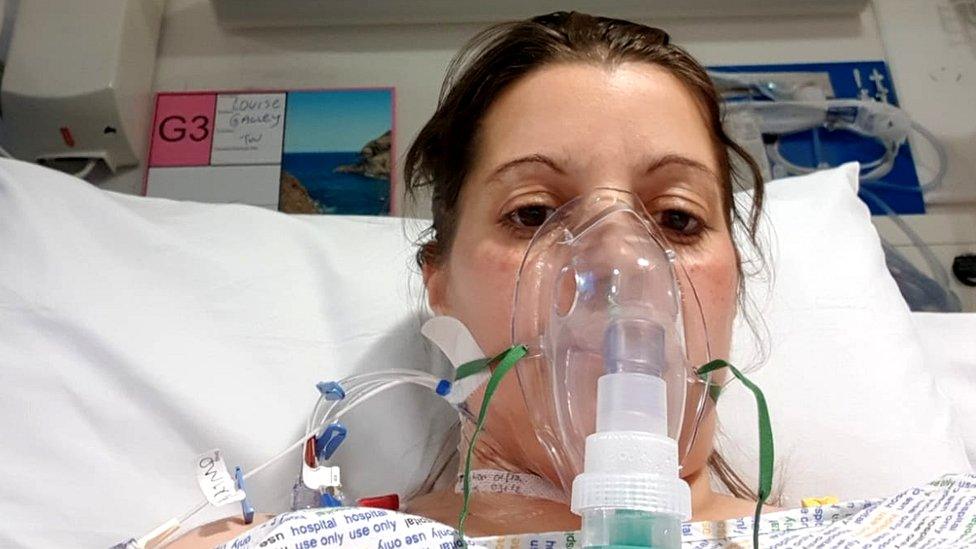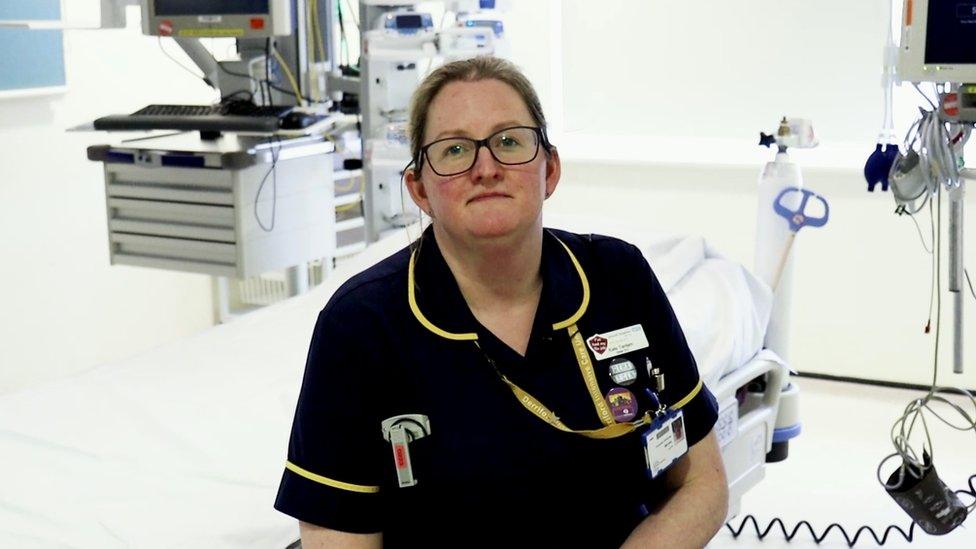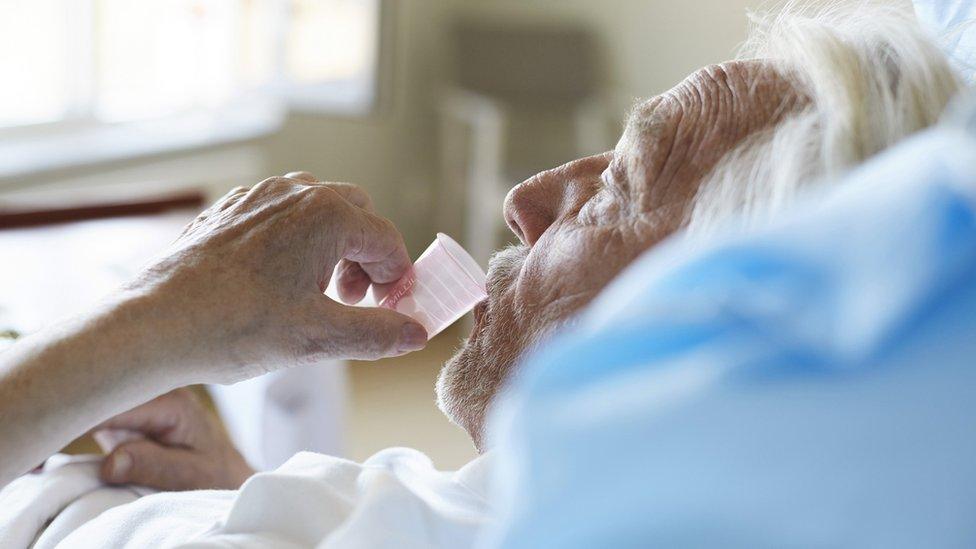Deliriums 'were reality for me'
- Published
Lou Gallie experienced intense hallucinations
When Lou Gallie went to hospital for a planned procedure, she was not worried - she had been through this before.
But in October 2018 she ended up in intensive care after a complication.
During her 78-day stay in Derriford Hospital in Plymouth, she experienced delirium, external - an acute confusional state.
Ms Gallie said the visions she experienced felt real and were ingrained in her mind like memories which left her with trauma she is still recovering from.
The 40-year-old recalls walking to the operation feeling relaxed and calm, but she does not remember coming round from the anaesthetic.
She was told she had recovered enough to start drinking and eating when her condition suddenly changed.

Ms Gallie's delirium involved intense hallucinations which felt like they lasted for weeks
Ms Gallie was rushed for a CT scan where doctors discovered a perforation and she was taken for emergency surgery.
"When I woke up from the surgery I was in a home run by nuns," she said.
"They were part of a religious sect. They told me to covert and to do the right thing as my family wanted me dead."
There are different types of delirium, but for Ms Gallie it involved intense hallucinations which felt like they lasted for weeks.
Another of her deliriums involved a series of riots outside the hospital.
"The hospital went into lockdown and people were throwing stones and starting fires.
"I was screaming in agony while, out of the window, teenagers were like hyenas, throwing bricks at the windows."

Ms Gallie said in one delirium she could see the local lifeboat
The deliriums were confusing, disorientating and stressful.
Ms Gallie remembers returning to her room after a scan and finding it had turned into an underground Olympic swimming pool.
She recalled: "I had an argument with my dad because I could see the local lifeboat in the water and I was trying to tell him about it.
"He had no idea what I was talking about and I found it so frustrating.
"I could see the lifeboat - it was right there.
"I couldn't understand why no-one could see what I could see."
For Ms Gallie these are memories - she knows they could not have happened but she remembers them as though they were a part of her life.
"These weren't just nightmares or dreams - these were reality for me.
"Even to this day these deliriums absolutely happened - they were my world."

What is delirium?

Specialist sister Kate Tantam said about 25% of people in hospital experience delirium
Kate Tantam, a specialist sister who is part of the rehabilitation team at Derriford Hospital's intensive care unit, said: "Delirium is an acute confusional state that happens to patients when they become unwell."
About 25% of people in hospital have delirium, but it can rise to 75% in intensive care.
"I think it's higher in intensive care because of the amount of physiological stress that we're putting the patients under because they're so unwell."
Ms Tantam said it was difficult to pin down exactly why delirium happens, but it was often related to circulating inflammatory chemicals that get activated by having an infection.
"While patients with delirium are often agitated, they can also be sleepy, withdrawn and compliant, making it harder to diagnose."
She said treating delirium was all about finding the factors that were causing it.
"We have to limit the amount of stress that we're putting a patient under," the specialist sister said.
"We make sure they've got adequate pain relief, we think about any infections that they could be having that we can spot and treat."
She said sometimes things as simple as making sure someone has their glasses and hearing aids can make a difference, as well as patients knowing whether it is day or night and being able to see their loved ones.
"One of the big things that can help is early mobilisation, which is why getting them moving is so important."

When Ms Gallie was moved from intensive care to a ward she asked a student nurse to tell her mum about the riots that had happened outside the hospital.
"He looked at me in complete wonder, not knowing what I was talking about," she said.
"There was no hospital lockdown, there were no riots… at that point we laughed, but I began to question what was real and what had only happened in my mind."
During her recovery in hospital, Ms Gallie was aware of her deliriums, but said it "wasn't really an issue" until she returned for a follow-up appointment after being discharged.
"I arrived in outpatients and had a complete meltdown. I couldn't move, I was frozen to the spot...
"I had no reason to be afraid - at no time did I receive any bad care or bad treatment - but there was obviously something going on psychologically in my head that gave me this almighty fear of being back."
After this she asked about the follow-up services at the intensive care unit and saw a psychologist which led to her being diagnosed with post-traumatic stress disorder (PTSD).
"I just assumed PTSD was something that people got after really traumatic incidents - I didn't see myself as critically ill or experiencing trauma.
"Once we had that diagnosis, she was able to treat me with something called EMDR.
"It involved talking through every scenario from arriving at hospital to when I was discharged.
"While I was talking, my eyes followed a light, and somehow my brain would process that and put it at the back.
"It's still a memory, but it's not a scary memory anymore."

Ms Gallie said writing a blog had helped her
The deliriums have created some gaps in her memory from years before she went to hospital.
"My husband proposed to me back in 2015 - I can't really remember that anymore.
"I liken it to an advent calendar where there are all these doors, but when they open up there's nothing behind them."
Ms Gallie has been told memory lapses can be quite common - sometimes memories return but sometimes they do not.
"There's no way I could have recovered the way I have without the help from the follow-up team. If they weren't there, I really don't know what would have happened.
"I was in such an unstable place in my head, but I didn't want to tell anybody."
Ms Gallie said writing a blog, external was one of the suggestions from the team which had helped her.
"Generally, I can deal with it quite well, but if I do have a wobble, I know the hospital's team is right there to catch me."

Follow BBC News South West on Twitter, external, Facebook, external and Instagram, external. Send your story ideas to spotlight@bbc.co.uk, external.
- Published2 November 2020

- Published30 September 2020

- Published19 May 2020
